The Bible Speaks Today | BST: Old Testament (33 vols.)
Digital Logos Edition
Overview
The Bible Speaks Today (BST) commentary series focuses on what Christians can learn from the Old Testament, rather than merely commenting on academic theories. Written largely by conservative evangelicals with real-world preaching and pastoral experience, the series often acts as a collection of expository sermons—rich with practical implications.
Originally published in 1968, the first title in the series was John Stott's The Message of Galatians. It went on to become an incredibly beloved commentary, providing "excellent models for expository preachers, combining clarity of communication with careful exegesis, theological literacy and wise application. But they have also been eminently devotional," said Derek Tidball, series editor of the companion Bible Speaks Today Themes series. In the years since this series was first launched, more than one million copies have been sold of the Old and New Testament volumes.
Interested in more from the BST series? Complete the set with The Bible Speaks Today: New Testament (22 vols.).
The Message of Psalms will display as a single resource in your digital library.

- All thirty-three volumes of the BST Old Testament series
- Applies the truth of Scripture to everyday life in the contemporary world
- Engages a variety of readers with accessible, nontechnical language
- Analyzes the flow of thought in passage-by-passage exposition of Old Testament books
- Provides insightful treatment of key themes
The BST series, now complete, covers all sixty-six books of the bible (Old and New Testaments) in fifty-five volumes. If you preach or teach from Scripture, the Bible Speaks Today series will help you apply the timeless biblical message to the everyday experiences of your listeners. And if you study the Bible on your own, these volumes will be a helpful resource focusing on the significance of God's Word for your own life and work..
The Bible Speaks Today series, according to John Stott, is characterized by the following threefold ideal:
- Expound the Biblical Text with Accuracy
- Relate it to Contemporary Life
- Make it Readable
The equivalent print editions in this collection of commentaries are over 5,700 pages. And now, with Logos Bible Software, you can search every page for a passage or topic in only seconds.
These volumes are models of fruitful exposition.
J. I. Packer, Board of Governors’ Professor Emeritus, Regent College, Vancouver, B.C.
Represents first-quality biblical scholarship from an evangelical perspective.
Preaching Magazine
Popular and useful for every pastor, teacher and thoughtful believer.
Southwestern Journal of Theology
- Title: The Bible Speaks Today: Old Testament
- Editor: J.A. Motyer
- Series: The Bible Speaks Today (BST)
- Publisher: IVP UK
- Publication Dates: 1984–2015
- Volumes: 32
- Pages: 7,656
- Christian Group: Evangelical
- Resource Type: Commentaries
- Topic: Old Testament
- The Message of Genesis 1–11: The Dawn of Creation by David J. Atkinson
- The Message of Genesis 12–50: From Abraham to Joseph by Joyce G. Baldwin
- The Message of Exodus: The Days of Our Pilgrimage by J. Alec Motyer
- The Message of Leviticus: Free to Be Holy by Derek Tidball
- The Message of Numbers: Journey to the Promised Land by Raymond Brown
- The Message of Deuteronomy: Not by Bread Alone by Raymond Brown
- The Message of Judges: Grace Abounding by Michael Wilcock
- The Message of Ruth: The Wings of Refuge by David J. Atkinson
- The Message of Samuel: Personalities, Potential, Politics and Power by Mary J. Evans
- The Message of Kings: God is Present by John W. Olley
- The Message of Chronicles: One Church, One Faith, One Lord by Michael Wilcock
- The Message of Ezra and Haggai: Building for God by Robert Fyall
- The Message of Nehemiah: God’s Servant in a Time of Change by Raymond Brown
- The Message of Esther: God Present but Unseen by David Firth
- The Message of Job: Suffering and Grace by David J. Atkinson
- The Message of Psalms 1–72: Songs for the People of God by Michael Wilcock
- The Message of Psalms 73–150: Songs for the People of God by Michael Wilcock
- The Message of Proverbs: Wisdom for Life by David J. Atkinson
- The Message of Ecclesiastes: A Time to Mourn, and a Time to Dance by Derek Kidner
- The Message of the Song of Songs: The Lyrics of Love by Tom Gledhill
- The Message of Isaiah: On Eagles’ Wings by Barry G. Webb
- The Message of Jeremiah: Against Wind and Tide by Christopher J.H. Wright
- The Message of Lamentations: Honest to God by Christopher J.H. Wright
- The Message of Ezekiel: A New Heart and a New Spirit by Christopher J.H. Wright
- The Message of Daniel: His Kingdom Cannot Fail by Dale R. Davis
- The Message of Hosea: Love to the Loveless by Derek Kidner
- The Message of Joel, Micah & Habakkuk: Listening to the Voice of God by David Prior
- The Message of Amos: The Day of the Lion by J. Alec Motyer
- The Message of Obadiah, Naham & Zephaniah: The Kindness and Severity of God by Gordon Bridger
- The Message of Jonah: Presence in the Storm by Rosemary Nixon
- The Message of Zechariah: Your Kingdom Come by Barry G. Webb
- The Message of Malachi: “I Have Loved You” Says the Lord by Peter Adam
- The Message of Joshua by David G. Firth
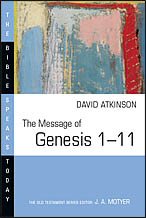
The early chapters of Genesis proclaim the origin of the world and of human life on earth. They uncover the origins of evil. They illuminate the meaning of freedom. They express the harmony of creation, evoke wonder as God is portrayed in his creative power and beauty, and ultimately show us how and why we are—offering hope for the renewal of our natural world and for the healing of our broken relationships.
Writing as a scientist and as a pastor, David Atkinson avoids technicalities and speculation and provides a skillful guide to the text’s theological significance. While many commentaries on these chapters become tangled in problems of dating, authorship, and historicity, this tour of the opening chapters of Genesis focuses on the issues that really matter.
David J. Atkinson is retired as assistant bishop in Southwark Diocese. Previously, he was a fellow of Corpus Christi College in Oxford, England, an assistant curate of The Cathedral Church of St. Andrew, archdeacon of Lewisham, and bishop of Thetford. He is the author of several books and commentaries, including Pastoral Ethics: A Guide to the Key Issues of Daily Living.
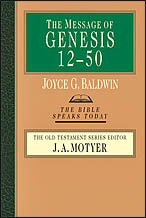
Abraham called out of Ur of the Chaldeans to go to Canaan, there to found a great nation, a blessing to all peoples. Isaac, Abraham’s son, taken to be sacrificed by his father, until God provided a substitute. Jacob, Isaac’s son, the schemer who cheated his older brother of his birthright, whose thigh (and heart) was broken as he wrestled all night with God’s messenger. Joseph, Jacob’s son, the dreamer sold into Egypt by his brothers, who meant it for evil while God meant it for good.
These are the patriarchs whose stories are told in Genesis 12–50. Why have these accounts been preserved? What importance do they have in the development of Israel’s understanding of God? What message from them does God have for us today? Joyce Baldwin skillfully weaves her answers to these questions, bringing the history of an ancient people to bear on our lives.
Joyce G. Baldwin was Old Testament scholar and former principal of Trinity College, Bristol. She is the author of several books including 1 & 2 Samuel, Daniel, and Haggai, Zechariah, and Malachi for the Tyndale Old Testament Commentaries series.
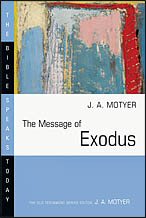
When the Lord promised the land of Canaan to Abram and his descendants (Genesis 15:7), every part of it was already occupied by other peoples. The long journey to possession of the Promised Land was prepared by God, yet it led through a path of adversity. We, the readers of the Old Testament, are left to wonder why.
J. Alec Motyer explores the character of God through His covenant promises and persistent faithfulness to the people of Israel. Through the story of Israel, we are exposed to an unquenchable fire: God the Savior, the Companion and the Indweller, who will not fail those who so often fail Him.
Motyer is largely successful in making the book of Exodus speak today. Motyer has clearly grappled with the Hebrew text in preparing his expositions, and thus his expositions are grounded on a scholarly analysis of the text.
—Stone Campbell Journal
J. Alec Motyer was formerly principal of Trinity College in Bristol, England. He has extensive experience in parish ministry and is well known as a Bible expositor. He is the author of several books including Original Language Pack v1.6 NIV, The Message of James, and The Message of Philippians.
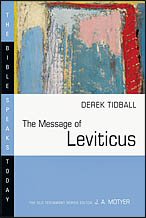
For most Christians today, there is no message of the book of Leviticus, for it often goes unread. Yet Leviticus was the first priority in Jewish instruction of the law of Moses. Jesus and His hearers knew Leviticus well and took its teachings to heart.
The Documentary Hypothesis (separate JEDP portions later redacted) that reigned supreme over Pentateuchal studies for most of the twentieth century undercut the internal coherence of Leviticus that swayed the Jews of the New Testament period speculating that Leviticus was the nostalgic revisionist history of Judaic reformers in exile, rather than Leviticus originating with Moses. But more recently, such theories have fallen from favor, and Leviticus is being reconsidered for its historical representation of the ancient and foundational era of the Jews.
Derek Tidball explores the picture in Leviticus of Israel being brought together under the law of Moses. Here is a definitive presentation of what life as the people of God was to be like: the civic, cultic, religious, moral, legal, family, and ritual expectations of the covenant community. He reveals the message brought to the Jews by Leviticus in their day, making room for us to grasp its message to us in our day.
Derek Tidball is visiting scholar at Spurgeon’s College, London. Previously, he served as principal of the London School of Theology, where he lectured in pastoral theology. He also served for many years as a Baptist pastor. He is the author of several books including The Reality of Christ: The Message of Colossians for Today, Skillful Shepherds: Explorations in Pastoral Theology, and some volumes for The Bible Speaks Today: Old Testament series. He is the editor of The Bible Speaks Today: Bible Themes series.
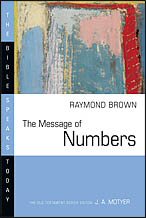
The book of Numbers is one of the lost books of the Bible—lost because it is neglected by many Christians. Named for its two “numberings,” or censuses, of Israel—the generation that left Egypt and the generation that entered the land of promise—Numbers frames a fascinating account of the pilgrim people Israel learning to trust God. Readers are frequently puzzled by the dazzling variety of literature that makes up this book of Numbers and wonder how to make sense of the whole.
Raymond Brown discloses the careful design and message of Numbers. He shows how God provides for the basic needs of the ideal life: to be loved, to be free, to be clean, and to be sure. He also highlights the rich theological themes, untangles its meaning for today’s readers, and shows its enduring relevance for God’s people.
Raymond Brown was formerly principal of Spurgeon’s College in London, England, and he has also served in several pastorates. He is the author of several books, including The Message of Hebrews and Spirituality in Adversity: English Nonconformity in a Period of Repression, 1660–1690.
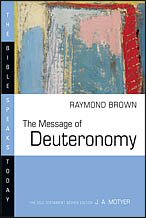
Reading Deuteronomy can be like standing among the children of Israel before Moses, hearing him address us as the next generation of the covenant people of God. Though we will soon pass over the Jordan into the good land, we will still struggle with temptations and opposition. Moses challenges us to face and apply God’s covenant word to new situations.
Raymond Brown guides Christians to hear and appreciate the timeless relevance of this message from the plains of Moab. God’s Law comes alive again as a guide to good living, as a call to wholehearted repentance, and as a promise of healing restoration under God’s merciful hand.
Raymond Brown was formerly principal of Spurgeon’s College in London, England, and he has also served in several pastorates. He is the author of several books, including The Message of Hebrews and Spirituality in Adversity: English Nonconformity in a Period of Repression, 1660–1690.
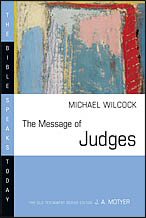
The book of Judges bustles with colorful characters. We meet Ehud, a left-handed political assassin who cleverly dispatches a corpulent king. We meet Deborah, a bold prophet and matriarch of Israel who musters the tribes to war. And we meet Samson, a Rambo-like warrior who dallies with women and annihilates Philistines in a temple of doom.
To Christian readers, Judges is interesting, sometimes inspiring, but also puzzling. What message should we take from it? How are we to understand the ambiguous spirituality of the judges themselves? What was God doing during this wayward period between Joshua and Samuel?
Michael Wilcock answers these and other questions with wit, insight, and sensitivity. God Himself is the Judge, he argues, who transcends the uncertain record of human judges. He is the principal actor in this drama. Always ready to respond to those who call on Him, He takes the initiative, uses raw human resources to preserve Israel from her enemies, and shapes the nation for His purpose. In exposing the twists, turns, and nuances of this story, he sends us back to the book of Judges with a renewed quest, not only to rediscover the story of God and Israel, but to find fresh perspective on the ways of God and His church in a post-Christian world.
Michael Wilcock was formerly director of pastoral studies at Trinity College, Bristol. He retired from many years of pastoring churches in the United Kingdom, most recently St. Nicholas’ Church, Durham. He is the author of The Message of Revelation and The Message of Luke.
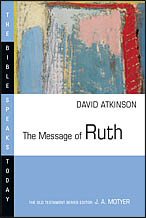
The book of Ruth is a tale of charm and delight. It tells about very ordinary people facing very ordinary events. We meet Naomi, who underwent hardship in famine and bereavement but eventually won peace and security. We meet Ruth, a young foreign woman from Moab who attached herself to her mother-in-law, Naomi, and to Naomi’s God. And we meet Boaz, who, by marrying Ruth, fitted into God’s purposes for history. Both King David and Jesus are numbered among their descendants.
Goethe calls it “the loveliest complete work on a small scale, handed down to us as an ethical treatise and an idyll.” Another writes, “No poet in the world has written a more beautiful short story.” David Atkinson demonstrates clearly that the story of Ruth, theologically, is a story about God’s providence.
David J. Atkinson is retired as assistant bishop in Southwark Diocese. Previously, he was a fellow of Corpus Christi College in Oxford, England, an assistant curate of The Cathedral Church of St. Andrew, archdeacon of Lewisham, and bishop of Thetford. He is the author of several books and commentaries, including Pastoral Ethics: A Guide to the Key Issues of Daily Living.
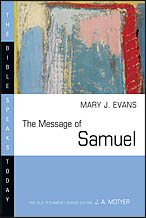
The books of 1 and 2 Samuel witnesses the transition of Israel from tribal confederacy to established monarchy. And during such transition, questions of identity and power are unavoidable. In the aftermath of the decline of the judges, priests abuse their priestly privileges, a people covets the centralized authority of its impious neighbors, and a throne is won, forsaken, redeemed, lost, and found again.
Mary J. Evans shows, in this dawning era of Israelite history, what is hidden behind the faults and failings of Israel’s best and brightest key characters. It is the faithfulness of God who looks on the heart and directs the path of every king and every kingdom.
Mary J. Evans formerly taught Old Testament at London School of Theology. She is the author of several books, including Woman in the Bible and the volume on 1 and 2 Samuel in the Understanding the Bible Commentary series.
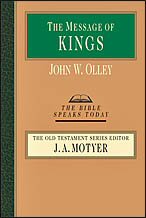
At the beginning of 1 Kings, Solomon’s reign brought peace, prosperity, dynamic international trade, and a magnificent center of worship. At the end of 2 Kings, by contrast, the people faced a complete reversal: they and their king were in exile; Jerusalem and the temple lay in ruins. How can this story of reversal, told by the very people who suffered the defeat, be of value today, and equip us “for every good work?”
John Olley shows how 1 and 2 Kings retell the past as preached history, addressing the exilic situation of the original readers. This in turn helps as we ask how they speak to us today. Within the account of paths leading to short-term success but ultimate failure, there are pointers of hope, of God’s continuing purposes and promises, and of the people’s response in the present.
In rich and often surprising ways, the narrative in 1 and 2 Kings is part of the history that has shaped, and will continue to shape, the faith and life of Christian believers. Everyday life, along with the turmoil of national and global events, is the arena in which God’s people are called to worship, trust, and obey him, and it is on aspects of this life that 1 and 2 Kings can throw light.
John W. Olley is a research associate at Vose Seminary, Perth (formerly the Baptist Theological College of Western Australia), where he previously served as principal. He has lectured in Hong Kong and has continued involvement in the ministry of Global Interaction. His publications include a commentary on the Septuagint Greek text of Ezekiel.
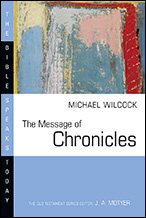
Michael Wilcock sees 1 and 2 Chronicles as first and foremost a sermon. Its object is to foster a right relationship between God and His people. The Chronicler finds in the records of Israel the “great overall pattern” of God’s hand in history. The Lord’s constant mercy, love, and faithfulness shine through. With great perception, the Chronicler first selects and then proclaims this vibrant pattern, highlighted in the living events of the nations’s actual history.
Once its purpose is grasped, the book comes alive. It can be seen as nothing less than a final and momentous look back over the entire Old Testament. Viewed in this way, 1 and 2 Chronicles has something of the vividness, contrast, and drama of the last book of the New Testament, Revelation. Michael Wilcock sees the countless persons named and chronicled as part of one people of the living God. They make vivid to us the truths by which the Lord’s people in every generation are to live.
Michael Wilcock was formerly director of pastoral studies at Trinity College, Bristol. He retired from many years of pastoring churches in the United Kingdom, most recently St. Nicholas’ Church, Durham. He is the author of The Message of Revelation and The Message of Luke.
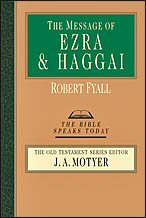
With its emphasis on the Torah, the story of Ezra is linked with the story of the exodus of the Jews from Egypt and their identity as the people of God. While Ezra prays for changed hearts and the forgiveness of sin, he looks forward to the Messiah and the fulfillment of all God’s promises.
Haggai is pressed into service to offer a prophetic voice to the crisis detailed in Ezra. To those Israelites who returned from exile to Jerusalem and faced an external opposition to the rebuilding of the temple, he encourages a relucatant people to give to an ailing fabric fund while reminding them of the Mosaic legacy and the Messianic promise.
Robert Fyall highlights the contemporary parallels of the challenges Israel faced to those of today’s church, and demonstrates the relevance of the books of Ezra and Haggai for God’s people in all times. While Ezra is rarely, if ever, preached on and Haggai gets an even shorter consideration, the message of these books—the need for obedience to God’s word and for openness to His Spirit—is one which needs to be heard clearly today.
Robert Fyall is senior tutor in ministry for the Cornhill Training Course at Scotland. He was director of Rutherford House—a research, training, and publishing center in Scotland for church leaders. He also taught Old Testament at St. John’s College in Durham, England, in addition to pastoring a church there. He is the author of Daniel: Tale of Two Cities, Teaching Amos: Unlocking the Prophecy of Amos for the Bible Teacher, and Now My Eyes Have Seen You: Images of Creation and Evil in the Book of Job.
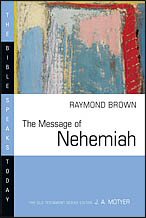
The book of Nehemiah is about starting over again. Nehemiah, one of Israel’s great leaders, tells firsthand the powerful story of the rebuilding of ancient Jerusalem’s walls after the exile. This rebuilding, in the face of great odds, represented the people’s renewal of faith, their overcoming of national shame, and the reforming of their conduct.
Raymond Brown, in sizing up Nehemiah the man, surmises, “He must surely be regarded as one of the most inventive and resilient personalities in the rich tapestry of Old Testament biography.” He vividly sketches Nehemiah’s historical and social setting and demonstrates the striking relevance for today of his dominant themes: Nehemiah’s doctrine of God, his passion for Scripture, his experience of prayer, and his example of leadership.
Raymond Brown was formerly principal of Spurgeon’s College in London, England, and he has also served in several pastorates. He is the author of several books, including The Message of Hebrews and Spirituality in Adversity: English Nonconformity in a Period of Repression, 1660–1690.
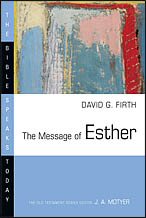
By any assessment, Esther is a rather strange book to find in the Bible. Not only is it, along with Daniel, the only books of the Bible to be set entirely outside of the Promised Land, it also shows no interest in that land. Esther is the only book in the Bible which definitely does not mention God. None of this should be taken as meaning that the book has no theological intention. On the contrary, it has a developed theology, but it is a theology which operates precisely because it does not mention God directly.
David Firth explores this paradoxically important book and its implications for our own contemporary context, where the reality of God’s presence is experienced against a backdrop of God’s relative anonymity and seeming absence.
David G. Firth is lecturer in Old Testament at St. John’s College in Nottingham, England. He is the author of Surrendering Retribution in the Psalms: Responses to Violence in the Individual Complaints and Interpreting the Psalms: Issues and Approaches.
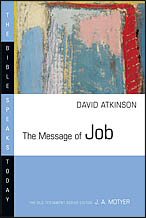
Why do people suffer? What is God’s role in suffering? How can we help those who suffer? The fact of suffering in the world challenges us with its questions. The book of Job is all about human suffering. We meet a man who is afflicted physically and emotionally. We encounter friends who do their best, but make things worse. We are brought face-to-face with intellectual puzzles. Above all this, and because of it, we find Job struggling with his faith in God.
David Atkinson offers a compelling exploration of Job’s story. He shows the power of the book of Job to reach into our human situation and to engage with our human needs. It offers, he believes, the strong comfort which comes from knowing that someone else has been there before. The message of Job is both a comfort to us in our own suffering, and it serves as a model for our ministry of counseling to others in pain.
David J. Atkinson is retired as assistant bishop in Southwark Diocese. Previously, he was a fellow of Corpus Christi College in Oxford, England, an assistant curate of The Cathedral Church of St. Andrew, archdeacon of Lewisham, and bishop of Thetford. He is the author of several books and commentaries, including Pastoral Ethics: A Guide to the Key Issues of Daily Living.
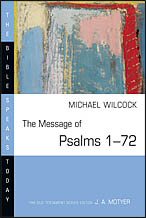
The book of Psalms is a favorite of Christians, even though we frequently read it in portions and pieces, hopscotch through the familiar, and avoid the odd, the unpleasant, and the difficult. But though the individual psalms arose from an assortment of times, experiences, and settings, the book of Psalms is composed in a deliberate pattern, not as a random anthology. The meaning of the Psalms is discovered in this pattern and order.
Michael Wilcock has written a sort of travel guide to the Psalms. In this book, he invites us to begin our journey through the gateway of Psalms 1 and 2, with their summons to obedience. In his sequel, The Message of Psalms 73–150, he ends with Psalm 150, singing its song of praise. In between, we pass through all the “yes, buts” of faith—the conflicts, the burdens, the mysteries, and the sufferings of life. In these laments and praises, hymns and liturgies, the Bible continues to speak clearly today.
Michael Wilcock was formerly director of pastoral studies at Trinity College, Bristol. He retired from many years of pastoring churches in the United Kingdom, most recently St. Nicholas’ Church, Durham. He is the author of The Message of Revelation and The Message of Luke.
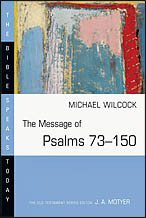
The book of Psalms is a favorite of Christians, even though we frequently read it in portions and pieces, hopscotch through the familiar, and avoid the odd, the unpleasant, and the difficult. But though the individual psalms arose from an assortment of times, experiences, and settings, the book of Psalms is composed in a deliberate pattern, not as a random anthology. The meaning of the Psalms is discovered in this pattern and order.
Michael Wilcock has written a sort of travel guide to the Psalms. In his previous book, The Message of Psalms 1–72, he invited us to begin our journey through the gateway of Psalms 1 and 2, with their summons to obedience. In this sequel, he ends with Psalm 150, singing its song of praise. In between, we pass through all the “yes, buts” of faith—the conflicts, the burdens, the mysteries, and the sufferings of life. In these laments and praises, hymns and liturgies, the Bible continues to speak clearly today.
Michael Wilcock was formerly director of pastoral studies at Trinity College, Bristol. He retired from many years of pastoring churches in the United Kingdom, most recently St. Nicholas’ Church, Durham. He is the author of The Message of Revelation and The Message of Luke.
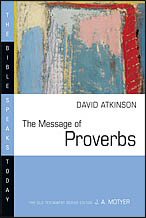
The book of Proverbs is the most practical book in the Bible. Its instruction in the art of living has been long tried and long proven. Its proverbial seeds of discernment are ready to be planted and rooted in the receptive soil of Wisdom’s sons and daughters today.
The ancient voice of Lady Wisdom still cries out today. She summons us to the life skills of godliness and helps us say no to the foolish and destructive enticements that inhabit the malls, campuses, housing divisions, and office buildings of the postmodern world. But as much as we glean from the surface of the book of Proverbs, there remains still more in its depths.
David Atkinson wonderfully illuminates the ancient cultural and religious background of the discourses and sayings of Proverbs. Wisdom’s values are brought into sharp relief. More important, he brings the wisdom from the book of Proverbs into conversation with the wisdom of God now more fully displayed in Christ. In this way, the place of the book of Proverbs in the pattern of God’s Word is clearly accented.
David J. Atkinson is retired as assistant bishop in Southwark Diocese. Previously, he was a fellow of Corpus Christi College in Oxford, England, an assistant curate of The Cathedral Church of St. Andrew, archdeacon of Lewisham, and bishop of Thetford. He is the author of several books and commentaries, including Pastoral Ethics: A Guide to the Key Issues of Daily Living.
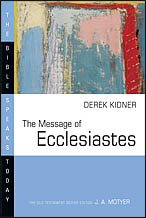
“Vanity of Vanities,” says the Preacher, “Vanity of vanities! All is vanity.” (Ecclesiastes 1:2) Is that what life is all about? A wisp of vapor, a puff of wind, a mere breath—nothing you can get your hands on—the nearest thing to zero? So says the Preacher in the book of Ecclesiastes. But is this the whole message of Ecclesiastes?
Derek Kidner introduces this book of Ecclesiastes, which speaks so powerfully, to our generation. His love of Hebrew poetry and his understanding of biblical mind shine through in this book.
Derek Kidner began his writing career while serving as warden of Tyndale House in Cambridge from 1964 to 1978, publishing his ninth and final book, The Message of Jeremiah, in 1987. He is the author of the volumes on Psalms 1–72, Psalms 73–150, Proverbs, Genesis, and Ezra and Nehemiah in the Tyndale Commentary series.
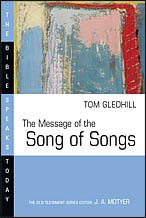
At first reading, the Song of Songs appears to be an unabashed celebration of the deeply rooted urges of physical attraction, mutual love, and sexual consummation between a man and a woman.
Tom Gledhill maintains that the Song of Songs is in fact just that—a literary, poetic exploration of human love that strongly affirms loyalty, beauty, and sexuality in all their variety. With tender metaphor and extravagant imagery, the Song of Songs writer spins a tale of human love into the cadence of verse, innocent of our quest for historical persons behind the text.
But in God’s story, human beauty, intimacy, and sexuality are not ends in themselves. They are transencedental longings, whispers of immortality. Like all of creation, they point beyond themselves to their divine Author, who in this Song of Songs is nowhere mentioned but everywhere assumed. This book is a refreshing reminder of the Song of Song’s ancient and vibrant affirmation of human sexuality that forms an interlude in the Old Testament story and echoes between the lines of Christian revelation.
Tom Gledhill is lecturer in biblical languages and Old Testament at the Evangelical Theological College of Wales in Bridgend, Glamorgan, Wales.
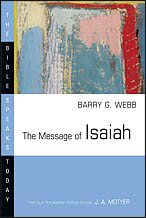
Ever since Jesus read from the scroll of Isaiah in the synagogue of Nazareth, Christians have gravitated to this great prophecy as the interpretive center of the Old Testament. Here the story of Israel, scourged by judgment and exile yet hopeful of restoration, is framed by its witnesses, heaven and earth. How will Israel be brought through its school of suffering and be propelled toward its divine destiny as the vanguard of a new heaven and earth? In the visionary world of Isaiah, the varied themes and imagery of the Old Testament converge and blend to transcend their plainest meanings as they project an extraordinary climax of the story of Israel and of the world.
Barry Webb calls Isaiah the “Romans” of the Old Testament, where all the threads come together and the big picture of God’s purposes for His people and for His world are most clearly set forth. Attuned to the magnificent literary architecture of Isaiah, he escorts us through this prophecy and trains our ears and hearts to resonate with its great biblical-theological themes.
Barry G. Webb is senior research fellow in Old Testament at Moore Theological College in New South Wales, Australia. He also serves as assistant editor of Reformed Theological Review. He is the author of several books, including The New International Commentary on the Old Testament: The Book of Judges, The Book of the Judges: An Integrated Reading, and Five Festal Garments: Christian Reflections on the Song of Songs, Ruth, Lamentations, Ecclesiastes and Esther.
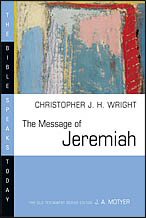
The prophet Jeremiah addressed the people of Judah and Jerusalem over a forty-year period leading up to the destruction of Jerusalem in 587 BC. The book of Jeremiah addresses the exiles, especially those in Babylon, in the years after the catastrophe. Here we encounter Jeremiah the prophet who, from his youth to old age, delivered the word of God to the people of Israel at the most terrifying time in all their troubled history. Understanding Jeremiah’s context is essential to understanding his life and message.
We must encounter the God of Jeremiah—an encounter that should be both profoundly disturbing and ultimately reassuring, as it was for him. If Jeremiah spoke in his day and if the book still speaks today, in both cases it is God who called the man to speak and commanded the book to be written for his day and for our day. Jeremiah is a book of the victory of God’s love and grace. His redemptive, reconstructive work comprises the book’s portrait of the future—a future that we see fulfilled in the New Testament through the life, death, and resurrection of Jesus the Messiah. Ultimately we see it in God’s dwelling with his redeemed people forever in the new creation.
A replacement volume in The Bible Speaks Today: Old Testament series, this book offers a new exposition on the book of Jeremiah.
This is a great pastoral commentary that shows how the difficult-to-understand book of Jeremiah applies today.
—Elliot Ritzema, Bible Study Magazine
Christopher J.H. Wright is international ministries director of the Langham Partnership, providing literature, scholarships, and preaching training for pastors in Majority World churches and seminaries. He is the author of several books, including The Mission of God’s People: A Biblical Theology of the Church’s Mission, The God I Don't Understand: Reflections on Tough Questions of Faith, Knowing the Holy Spirit through the Old Testament.
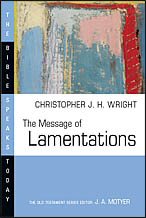
The Message of Lamentations: Honest to God
- Author: Christopher J.H. Wright
- Editor: J.A. Motyer
- Series: The Bible Speaks Today
- Publisher: IVP UK
- Publication Date: 2015
- Pages: 117
The destruction of Jerusalem by the Babylonians in 587 BC is the likely setting for the book of Lamentations. This was the most traumatic event in all of Old Testament history, with its extreme human suffering, devastation of the ancient city, national humiliation, and the undermining of all that was thought to be theologically guaranteed like the Davidic monarchy, the city of Zion, and the temple of God of Israel. It is out of that unspeakable pain that Lamentations speaks in poetry of astonishing beauty and intricacy, though soaked in tears.
If we neglect this book, says Christopher J.H. Wright, we miss the challenge and reward of wrestling with the massive theological issues that permeate it. How can suffering be endured alongside faith in an all-loving, good God? Even if these events are recognized and accepted as God’s judgment, has not the flood of brutality and evil gone beyond all bounds? If anarchy, death, and destruction stalk the land, can the center of Israel’s faith in the covenant God of faithfulness and mercy hold? He shows that as Christian readers we must not, and cannot, isolate Lamentations from the rest of the Bible, and, equally, that we should not read the rest of the Bible without Lamentations. We must still let it speak for itself as a book for today.
Christopher J.H. Wright is international ministries director of the Langham Partnership, providing literature, scholarships, and preaching training for pastors in Majority World churches and seminaries. He is the author of several books, including The Mission of God’s People: A Biblical Theology of the Church’s Mission, The God I Don't Understand: Reflections on Tough Questions of Faith, Knowing the Holy Spirit through the Old Testament.
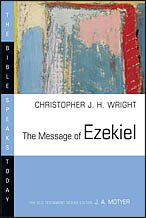
Ezekiel comes to us as a stranger from a distant time and land. Who is this priest who, on his thirtieth birthday, has a dazzling vision of God on a wheeled throne? Who is this odd prophet who engages in outlandish street theater and speaks for God on international affairs? Who is this seer who paints murals of apocalyptic doom and then of a restored temple bursting with emblems of paradise? Are we bound to take this literally, reading prophet and newspaper side by side? Or is there a better way?
Christopher Wright is a proven interpreter and communicator of the Old Testament, and he masterfully opens our eyes to see and understand the message of Ezekiel. Ezekiel’s vision of the glory of God—its departure and return—is first set within Israel’s history and then in the culmination of God’s promises in Christ. Embedded in the pattern of the strange, the bizarre, and the wonderful is a word that still speaks to God’s people today.
Christopher J.H. Wright is international ministries director of the Langham Partnership, providing literature, scholarships, and preaching training for pastors in Majority World churches and seminaries. He is the author of several books, including The Mission of God’s People: A Biblical Theology of the Church’s Mission, The God I Don't Understand: Reflections on Tough Questions of Faith, Knowing the Holy Spirit through the Old Testament.
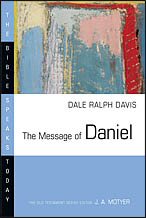
God had allowed the unthinkable to happen. His people were in exile in Babylon, and His promises seemed shattered. Was He really in control? Was He faithful? Did He still care? One young man, Daniel, affirmed God’s sovereignty and love, although it was not without cost.
The book of Daniel contains well-known stories: Daniel in the den of lions, his three companions—Shadrach, Meshach, and Abednego—in a fiery furnace, and the strange handwriting on the wall at Belshazzar’s feast, which struck terror in the heart of the Babylonian king. Daniel’s enigmatic visions and prophecies about the future, however, can be difficult to understand.
Dale Ralph Davis explores the background, discusses significant interpretive issues and problems, and offers a lively exposition of Daniel’s message, which may be summed up in the words of Jesus: “The end is not yet . . . but the one who endures to the end will be saved” (Mark 13:7, 13). The book of Daniel is a realistic survival manual for Christians, still vitally relevant for the church in today’s world.
A replacement volume in The Bible Speaks Today: Old Testament series, this book offers a new exposition on the book of Daniel.
David, obviously a capable preacher, explains the background to Daniel, sifts through interpretive issues (some of them quite problematic) and then offers a faithful exposition of the book's message. Recommended.
—Bob Robinson, Latimer Fellowship
This is a commentary that serves both the laity and preachers. Davis doesn’t load the text with too many technical points but allows for a good flow for reading. He retains the technical elements but keeps them in the footnotes. It definitely serves as a wonderful entry point into the book of Daniel.
—Kent I. Compton, Haddington House Journal
Dale Ralph Davis is former pastor of Woodland Presbyterian Church in Hattiesburg, Mississippi, and professor of Old Testament at Reformed Theological Seminary in Jackson. He is the author of several books, including The Word Became Fresh: How to Preach from Old Testament Narrative Texts, A Study Commentary on Micah, and Job: Will You Torment a Windblown Leaf?.
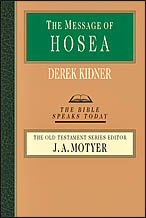
“Go and marry a prostitute.” These are the first words God spoke to his prophet Hosea. Why would he ask this of one of his spokesmen? Because he wanted to teach Hosea, the nation of Israel, and all of us today a lesson that we will not forget, a lesson that is painful yet joyous.
Hosea’s somber portrait of the human condition is our lesson in pain. All of us have played the harlot by forsaking God and His ways. The picture is not pretty, but it’s true. Yet Hosea’s clear illustration of God’s love for us brings joy. While we are yet sinners, God comes to us and loves us.
Derek Kidner takes us through the unfolding story of Hosea and his wife, Gomer, explains the basic message, points out the subtleties, and encourages readers to live lives worthy of God who loves the loveless.
Derek Kidner began his writing career while serving as warden of Tyndale House in Cambridge from 1964 to 1978, publishing his ninth and final book, The Message of Jeremiah, in 1987. He is the author of the volumes on Psalms 1–72, Psalms 73–150, Proverbs, Genesis, and Ezra and Nehemiah in the Tyndale Commentary series.
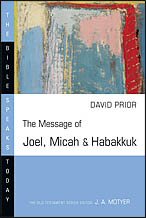
Where is God in times of disaster? How can God allow suffering? What are God’s people to do about moral decay in society? While people throughout the ages have long pondered these questions, three of the minor prophets—Joel, Micah and Habakkuk—provide insights to these perennial problems.
The people of Joel’s day were devastated by a locust plague, which Joel said warned of the coming Day of the Lord. Micah rebuked a culture of corruption and moral evil. Habakkuk cried out to the Lord on account of a society bent on violence.
David Prior’s exposition of these three books points to a transcendent God who gives hope in times of uncertainty for today’s church.
David Prior has pastored churches in Cape Town, South Africa, and Oxford, England, and has served as director of The Centre for Marketplace Theology in London. He is the author of The Message of 1 Corinthians.
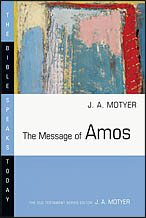
Amos observes the society in which he lived and worked. Affluence, exploitation, and profit motive were the most notable features everywhere. Standards were being compromised. People were despising authority and the rule of law. National leadership, while reeling in publicity and dignity of position, seemed to be contributing to the complete breakdown of law and order. J. Alec Motyer exposes and explains the astonishingly relevant—but never popular—message of the prophet Amos.
J. Alec Motyer was formerly principal of Trinity College in Bristol, England. He has extensive experience in parish ministry and is well known as a Bible expositor. He is the author of several books including Original Language Pack v1.6 NIV, The Message of James, and The Message of Philippians.
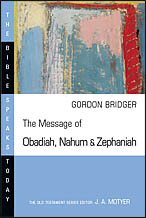
Obadiah, Nahum, and Zephaniah are probably among the least-read books of the Bible, and rarely preached. They relate to the real world of their day in the seventh century BC: sleaze amongst political leaders, unfaithfulness of religious leaders, national and personal pride, crimes against humanity, and persecution of God’s people. These books tackle themes and issues, which are especially relevant to today’s church and world.
Gordon Bridger encourages us to study and apply these three Old Testament prophets for several compelling reasons. They bring a message from God on the importance of focusing on God, of facing up to sin, of responding in repentance, and of looking to the hope of future salvation and restoration.
Gordon Bridger is a retired English minister who pastored in Cambridge, Edinburgh, and Norwich. He was principal of Oak Hill College, London, from 1987 to 1996. He is a member of the preaching team at Cromer Parish Church in Norfolk, England.
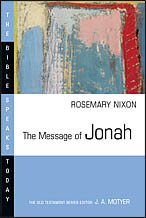
The book of Jonah is mostly remembered for its oddity—a runaway prophet swallowed by a whale! But there must be more to the book than that. And indeed there is. For one thing, it is a book artfully constructed, with one chapter devoted to a psalm. It is a book that will reward careful reading and meditation.
But more than that, we find, in the drama of Jonah, the charted course not just of this angular prophet but also of Israel’s attitude toward its most despised neighbor in the Mediterranean world. Jonah refuses to answer God’s call to go and proclaim judgement, because he knows God is the kind of God who responds in mercy and grace should the Assyrians repent. Jonah will have no part of it—until he is compelled. And even then he pities himself.
Rosemary Nixon’s book explores the book of Jonah in its own right, and it helps us make the connections with our view of God and His world today. The irony of this prophet’s story is amusing, but it reaches out and touches us where we are today.
Rosemary Nixon is vicar of All Saints’ Church in Cleadon, Sunderland. She was formerly principal of the Theological Institute of the Scottish Episcopal Church, Edinburgh, director of the urban studies unit in the parish of Gatehead, and tutor in Old Testament studies at Cranmer Hall, Durham. She is also the author of Priority of Perfection.
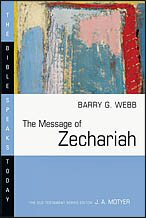
In oracles and visions, Zechariah challenged his hearers to return to the coming kingdom, to cleanse themselves in anticipation of the cleansing fountain of God’s grace, and to restore the city of Jerusalem in preparation for its coming glorification. The promises of God in the book of Zechariah are meant to fuel the faithfulness of God’s people and to prepare the way for the promised Messiah.
Barry G. Webb explores the kingdom of God as the prophet Zechariah apprehended it. The study of the book of Zechariah is bound to be enriching, for it is imbued from beginning to end with the same heart-cry that Jesus turned into a prayer for all of us: “Your kingdom come.”
Barry G. Webb is senior research fellow in Old Testament at Moore Theological College in New South Wales, Australia. He also serves as assistant editor of Reformed Theological Review. He is the author of several books, including The New International Commentary on the Old Testament: The Book of Judges, The Book of the Judges: An Integrated Reading, and Five Festal Garments: Christian Reflections on the Song of Songs, Ruth, Lamentations, Ecclesiastes and Esther.
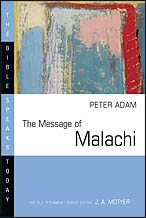
The book of Malachi fittingly sits in Christian Bibles as the last book of the Old Testament, which it assumes, summarizes, and applies. Yet it also looks forward to the New Testament with its promises of the coming reign of God.
A striking feature of the book of Malachi is the way in which every word of God is contradicted or questioned by His people. God’s persistence in speaking to them is a clear picture of sin and grace in close proximity. Furthermore, God’s people neither served Him wholeheartedly nor turned entirely away in blatant disobedience. This was not a neutral territory but a dangerous whirlpool of self-deception.
Peter Adam shows how the book of Malachi is God’s effective remedy for such a situation. The greatest sin of God’s people is the sin against God—the source of all sin against ourselves and others. At the heart of God’s people, the church, must lie a deep, overwhelming conviction that God loves them—just as he reminds Israel in His first words to them in the book of Malachi.
These ancient themes still challenge us today, and Adam continually points us toward the saving work of Christ while reminding us of them. The Message of Malachi will prove a valuable resource for those who desire to preach from Malachi or simply understand it better.
—Jason Brueckner, Bible Study Magazine
Peter Adam is principal of Ridley College in Melbourne, Australia. He was formerly vicar of St. Jude’s in nearby Carlton. He is the author of several books, including The Message of 1 Corinthians and Speaking God’s Words: A Practical Theology of Preaching.
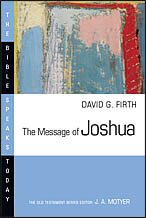
The book of Joshua recounts the momentous events of Israel’s entry into Canaan, the promised land: Joshua’s commission and reassurance, crossing the Jordan river, the capture of Jericho and Ai, the grand covenant renewal ceremony at Mount Ebal, the curious treaty with the Gibeonites, and a rapid overview of the campaigns in the south and the north. The second half of Joshua gives extensive details of the allotment of the land to each tribe, before resuming the conquest story and concluding with farewell speeches and burial notices. It is an action-packed story―but perhaps more than any other, Joshua is the Old Testament book that most troubles contemporary readers, whether Christians or critics: Isn’t there too much violence, and isn’t this inconsistent with the rest of Scripture, and the gospel?
David Firth begins his excellent exposition with a careful and helpful response to this issue. However, while addressing the problems is undoubtedly important, we must also consider how the book continues to speak to us today as God’s word. Firth’s basic contention is that we have to read Joshua as part of God’s mission, which for much of the Old Testament centered on Israel, but finds its ultimate focus in Jesus Christ. The book challenges those who have read it down through the ages to recognize that God not only includes those who join him in his mission, he also excludes those who choose to set themselves against it.
David G. Firth is lecturer in Old Testament at St. John’s College in Nottingham, England. He is the author of Surrendering Retribution in the Psalms: Responses to Violence in the Individual Complaints and Interpreting the Psalms: Issues and Approaches.
Reviews
3 ratings

Scott Groethe
8/6/2019
Something that is less than ideal is that one has to have two windows open, a NT window and an OT window so that the linking will work. That is, Logos doesn't seem to "see" the OT and NT as part of one commentary series, BST.
Iain Anderson
8/16/2017

Jim Snowden
8/20/2016
Excellent commentary series. Great insights and applications. The commentary series I often turn to first during sermon preparation.
David Aschenmeier
3/1/2016
A Time to Mourn, and a Time to Dance Derek Kidner, The Message of Ecclesiastes. IVP Academic, As Christians read through the New Testament, often pictures come to mind of a teacher and his disciples. We see Jesus Christ leading and teaching His disciples as they walk. We picture Paul, followed by his co-workers, instructing the new believers in the Gentile west. Kidner uses this imagery to involve the reader in the instruction found in the Old Testament book of Ecclesiastes. In The Message of Ecclesiastes, the author introduces the reader to "Qoheleth" (pronounced Ko-helleth or Ko-hellet), which is translated "the Preacher" in the NKJV. Qoheleth is the wise teacher who skillfully leads the reader through the contemplation of life, carefully keeping the subject of discussion "under the sun" until the last moment. Derek Kidner (1913-2008) was a graduate of Christ College in Cambridge, a Pastor in the Church of England, a senior tutor at Oak Hill Theological College, and finally, warden of book publisher Tyndale House. In his career as commentator, Kidner composed volumes for the Tyndale Old Testament Commentary series and for The Bible Speaks Today OT series. His experience is evident, as he puts himself in the place of teacher, interpreting without giving up too much and spoiling the tension that was originally intended by the words of the Preacher. The governing point Kidner keeps close at hand is found in the Preacher's opening volley: "Vanity of vanities! All is vanity!" Like the Preacher, the author keeps in mind the impact of the message upon the student as much as the transfer of wisdom. In The Message of Ecclesiastes, Kidner opens up and explains the machinery of the scriptures without obscuring the mastery of the original author. Not unusually, the commentary is begun with an explanation about where this book fits into the overall picture of the Biblical canon. Kidner asks "What is this book doing in the Bible?" Ecclesiastes nearly seems to persuade the reader to throw his hands up in frustration and wait for the end; this is hardly what we expect from the Bible. The commentator expresses our thoughts like this: "Triviality is more stifling than tragedy, and the shrug is the most hopeless of all comments on life (Kidner, 20)." However, Kidner points out the connection for us: The function of Ecclesiastes is to bring us to the point where we begin to fear that such a comment [all is vanity!] is the only honest one. So it is if everything is dying. We face the appalling inference that nothing has meaning, nothing matters under the sun. It is then that we can hear, as the good news which it is, that everything matters." If nothing under the sun has meaning, then the reader is goaded to consider the ultimate questions of life. Namely, as Kidner writes, we encounter God in our futility. "God meets us in this book in three main aspects: as Creator, as Sovereign, and as Unsearchable Wisdom." The meaning of life is found in our understanding of man's relationship to his Creator. Kidner deftly extracts the lesson of the Preacher concerning this relationship. First, I was surprised to find continuity in Ecclesiastes after reading Kidner's running commentary of the book. Ecclesiastes seemed to be a collection of grumbles and gripes about the utter dissatisfaction felt in trying out all that life has to offer. However, Kidner succeeds in showing the genius of Qoheleth in drawing the student's heart toward satisfaction in God. Second, I enjoyed Kidner's prose; he did not use many words where the original wrote briefly. Neither did he use overly flowery terms, but kept them grounded, easy for the student to reach. Last, I appreciate that Kidner takes a whole-book approach to interpreting passages. He sees the Preacher as taking away all human avenues of thought until he is able to build upon the only avenue left: the fear of God. The vanity of life is only so if there is no fear of God. The Message of Ecclesiastes draws out the modern-day relevance of this Old Testament book. Derek Kidner is a wise commentator with a respect for the force of the original text. Just like the Preacher, Kidner walks along with the reader and involves him in the lesson. I recommend this commentary not only to pastors, but also as a meaningful resource for Sunday school teachers and laymen.
Scott F. Marsh
7/24/2015
Woo-hoo! I have been waiting for the Old Testament volumes of "The Bible Speaks Today" series ever since Logos offered the New Testament volumes! This is a great series, and I highly recommend it to everyone! I have several of these OT volumes in print, but I can't wait to add them to Logos!